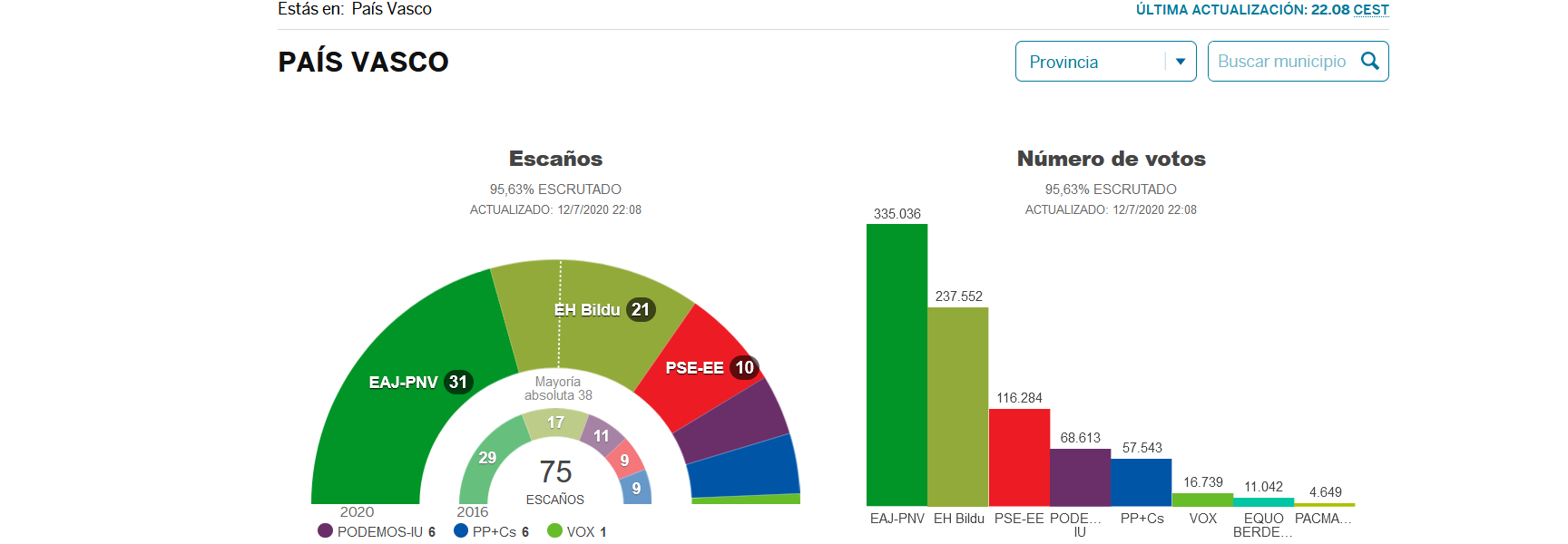Gains yes. But we still have conservative neo-liberal governments in Ireland, Scotland, the Basque Country, and Galicia.
Ben Wray is a freelance journalist leading BRAVE NEW EUROPE’S Gig Economy Project. He also produces a morning newsletter called Source Direct on Scottish politics, which you can sign-up to here: https://sourcenews.scot/mailing-list/
Cross-posted from Source
Sunday’s Spanish regional elections in the Basque Autonomous Community and Galicia did not produce a surprise in terms of the victors, but it did show that the trend of rising support for pro-independence parties in Europe has not been slowed by the pandemic.
In the BAC, EH Bildu, the left-wing pro-independence coalition, won nearly 28 per cent of the vote, its highest ever vote share by some distance, and up 7 per cent on the 2016 election, the only party to make large gains. That places EH Bildu, which only came into existence a decade ago, clearly as the second force in the southern Basque Country. The conservative Basque Nationalist Party (PNV) once again became the largest party, and is likely to enter into a coalition government with Spanish centre-left party PSOE. PNV have led the BAC Parliament in all but one administration since devolution was created in the post-Franco era, so there’s nothing new there, the difference now is that left and right Basque parties combined are winning two-thirds of the total vote, as the Spanish-wide parties across the political spectrum struggle for support.
In Galicia on the north-west of Spain, the left-wing Galician Nationalist Bloc (BNG) made remarkable gains, going from 8 per cent in 2016 to 23 per cent on Sunday, it’s best ever result and leap-frogging PSOE to become the main opposition force in Galicia. The Spanish centre-right party PP won an absolute majority, and thus retains the grip it has had on national politics in Galicia since the end of the dictatorship.
In both nations, EH Bildu and BNG gains were of a similar proportion to Podemos’ losses. The left-wing party was set-up in wake of the ‘Indignados’ movement at the start of the 2010s as a new anti-establishment force, and made a rapid electoral advance. But the receding of that movement, the Catalan independence crisis and its entry into coalition government with PSOE in January following the December General Election in Spain have all negatively affected the perception of the party, especially where an alternative on the left is available which has an unambiguous position on key constitutional issues like the right to decide on independence. Podemos leader and vice-President of Spain Pablo Iglesias admitted following the election that they had suffered an “unmitigated defeat”, and a “deep self-criticism” was needed.
The far-right Vox, which has emerged almost over-night as the third force in Spanish politics, won a seat in the BAC for the first time, a significant breakthrough for the neo-Francoist force. However, Vox’s gain should be put in perspective – they won just 2 per cent of the vote across the BAC, and only needed to jump a 3 per cent hurdle (6,200 votes) to win the regional list seat in Araba. In Galicia, they didn’t win any seats. They remain a relatively marginal force in Spain’s stateless nations.
The elections, one of the first in Europe since the crisis, were a demonstration in the dangers of asking voters to go to the polls when pandemic fears remain high. In the BAC, participation was at an all time low of 36 per cent, down 8 per cent on the 2016 election. Citizens infected with Covid-19 or self-isolating were controversially disenfranchised. Spain now has several localised outbreaks which looked at in combination suggest the country, one of the worst affected in Europe by Covid-19, could be on the verge of a second wave.
But take a step back and look at this election in the broader political context. The Irish nationalist Sinn Féin won a remarkable victory in February’s Republic of Ireland election, becoming the largest party for the first time and increasing its vote-share by 11 per cent. In Catalonia, the left independence Party Esquerra Republicana (ERC) won its highest ever vote share in a Spanish General Election in November last year, while the far-left pro-indy party CUP entered the Spanish Congress for the first time. In Scotland, the SNP has been the dominant force for some time. All these parties are winning the support of young people in particular, who have little binding them to the British and Spanish state in terms of national and political identity, while their economic status naturally leads to a revulsion of the status quo. The challenges these parties face in achieving their aims remain steep, but if there is one clear political trend in Europe that is likely to continue into the 2020s, it is the rise of the nationalist left.



Be the first to comment